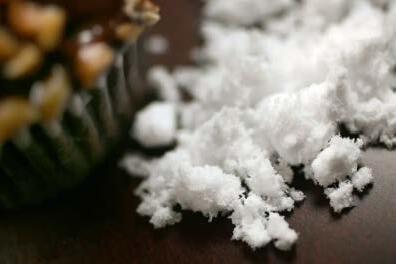Another Sugar Substitute Is Called Out for Potential Heart Risks

New research suggests the sweetener xylitol is linked to health issues. Here’s what to know.
A new study linking the low-calorie sugar substitute xylitol to an increased risk of heart attack or stroke has once again raised questions about the risks and benefits of sugar substitutes.
Xylitol is a sugar alcohol found naturally in fruits and vegetables, and even produced in the human body at very low levels. But it is often synthetically produced and is increasingly being added to processed foods, like candies and “low-sugar” baked goods, because it has 40 percent fewer calories than regular sugar does and doesn’t cause blood glucose to spike after a meal. The study authors said this rise in consumption was concerning, as the people most likely to turn to the sugar substitute may already be trying to manage conditions like obesity and diabetes that also increase the risk of cardiovascular issues.
“They may think they’re making a healthy choice by picking xylitol over sugar, yet the data argues that it is not the case.” said Dr. Stanley Hazen, the chair of cardiovascular and metabolic sciences at the Cleveland Clinic’s Lerner Research Institute and an author of the study. Last year, Dr. Hazen and his colleagues found a similar association with another sugar alcohol, called erythritol.
For the new study, the researchers measured the levels of xylitol in blood plasma samples of over 3,000 participants who had fasted overnight. They found that people with the highest xylitol levels had roughly double the risk of heart attack, stroke or death within the next three years compared to people with the lowest levels. The results were published in the European Heart Journal this month.
The research does not prove that sugar alcohols like xylitol and erythritol directly cause heart attacks, only that they’re associated with an increased risk. Because the researchers did not track the participants’ diets, other foods may also have contributed to that risk, said Marta Yanina Pepino, an associate professor of food science and human nutrition at the University of Illinois at Urbana-Champaign. And it’s possible some of the participants naturally produce more xylitol, and their high levels did not come entirely from food and drink, she said.
To address some of these concerns, Dr. Hazen’s team also fed xylitol to mice, added it to human blood samples in a lab and also gave drinks containing xylitol to 10 healthy volunteers. In each of the tests, xylitol increased how quickly platelets formed clots, which could eventually lead to a heart attack or stroke.
Taken together, the results suggest that xylitol may carry risks consumers should consider. Just because sugar substitutes like xylitol don’t contain many calories “doesn’t mean that they have no effect,” Dr. Pepino said.
The next step, outside experts said, is to compare how the risks and benefits of substitutes like xylitol compare to those of regular sugar. Research has consistently suggested that high sugar intake is associated with an increased risk of cardiovascular issues, such as heart attack and stroke.
“It’s possible that xylitol carries some risks compared to nothing, but the risks are smaller than if you consumed similar amounts of sugar,” said Dr. David Ludwig, an endocrinologist at Boston Children’s Hospital whose research has shown that some sugar substitutes can prevent weight gain, which is also a risk factor for cardiovascular disease. “I think the next question is how do you assess and balance your risk?
Xylitol in foods and drinks
To check how much xylitol you may be consuming, you need to carefully read nutrition labels.
Food and beverages that are marked as “sugar free” or “no added sugar” have to list the precise sugar alcohol amount under carbohydrates in the nutritional information. But if a product does not make these claims, it may not have to list exact amounts. This means that sugar alcohols like xylitol may actually lurk in many more products than consumers realize, including energy bars, nut butters, salad dressings and flavored drinks, Dr. Hazen said. You can sometimes spot xylitol and other sugar alcohols in the ingredient list by simply looking for words that end in “-ol,” like sorbitol and maltitol. Xylitol may also be listed under other names, such as birch sugar or the European code E967.
Xylitol is also often added to products meant to support oral health, such as mouthwashes, toothpastes and sugar-free gums. However, researchers don’t believe these are a meaningful source of xylitol consumption, because people ingest very little of these products, Dr. Hazen said.
Reducing your reliance on sugar substitutes
If you want to limit your consumption of xylitol and other sugar alcohols, start by reducing your consumption of processed foods. Then, try to tame your sweet tooth, Dr. Hazen said. Instead of reaching for sugar-free snacks and desserts, consider natural sweeteners in moderation, such as honey, maple syrup or agave nectar.
Even if you are diabetic, it may be better to rely on natural sugars for the occasional sweet treat, as long as you closely monitor your blood glucose so you can tailor your medication as needed, Dr. Pepino said.
Incorporating whole fruits and vegetables is another great way of satisfying sweet cravings while getting fiber and other nutrients that may help regulate the effects of sugar and sugar alcohols. When baking, you may also try recipes that use mashed fruits like bananas or applesauce instead of sugar or sugar substitutes.
Gradually try to decrease sugar and sugar substitutes in beverages as well, For instance, you can switch from sugar-free soda to seltzer flavored with a splash of fruit juice.
“Sugar substitutes are really meant to be used as stepping stones,” Dr. Ludwig said. “They should not be considered part of a healthy, low-carb diet over the long term.”